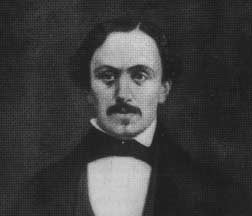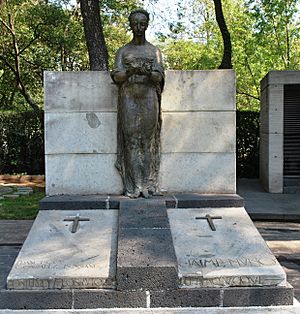Francisco González Bocanegra facts for kids
Francisco González Bocanegra was a famous Mexican poet. He was born on January 8, 1824, and passed away on April 11, 1861. He is best known for writing the words (lyrics) of the Mexican National Anthem in 1853.
Francisco was born in San Luis Potosí, San Luis Potosí. His father, José María González Yáñez, was a Spanish soldier. His mother, Francisca Bocanegra y Villalpando, was the sister of José María Bocanegra, who was a Secretary of Foreign Relations for President Vicente Guerrero.
In 1827, a law was passed that made most Spanish citizens leave Mexico. Even though Francisco's father was married to a Mexican, his family still moved to Spain. They lived in a port city called Cádiz. On December 28, 1836, his family returned to San Luis Potosí.
Francisco González Bocanegra is buried in Mexico City. His resting place is in the Rotonda de las Personas Ilustres, which means "Rotunda of Illustrious Persons." This is a special place for important people in Mexican history.
Writing the Mexican National Anthem
On November 12, 1853, the Mexican President, Antonio López de Santa Anna, announced a contest. He wanted someone to write a national anthem for Mexico. The winner would get a prize for the best poem that showed patriotic feelings.
Francisco González Bocanegra was a very talented poet. However, he was not interested in joining the contest. He felt that writing love poems was very different from writing a national anthem.
His fiancée, Guadalupe González del Pino (also called Pili), believed strongly in his poetry skills. She was upset that he kept refusing to enter the contest. Their friends also encouraged him to participate.
One day, Guadalupe tricked Francisco. She led him to a quiet bedroom in her parents' house. Then, she locked him inside! She told him she would not let him out until he wrote something for the contest. Inside the room, there were pictures showing different moments from Mexican history. These pictures helped him get ideas.
After four hours, Francisco had written all ten verses of his poem. He slipped them under the door to get his freedom back. After his fiancée and her father approved the poem, he submitted it. Francisco's poem won the contest by everyone's vote! He was announced as the winner on February 3, 1854, in the Official Journal of the Federation.
Later, in 1943, some changes were made to the official national anthem. Six of Francisco's ten verses were removed. Today, the anthem uses his chorus and only four of his original verses: numbers 1, 5, 6, and 10.
See also
 In Spanish: Francisco González Bocanegra para niños
In Spanish: Francisco González Bocanegra para niños
 | Delilah Pierce |
 | Gordon Parks |
 | Augusta Savage |
 | Charles Ethan Porter |



